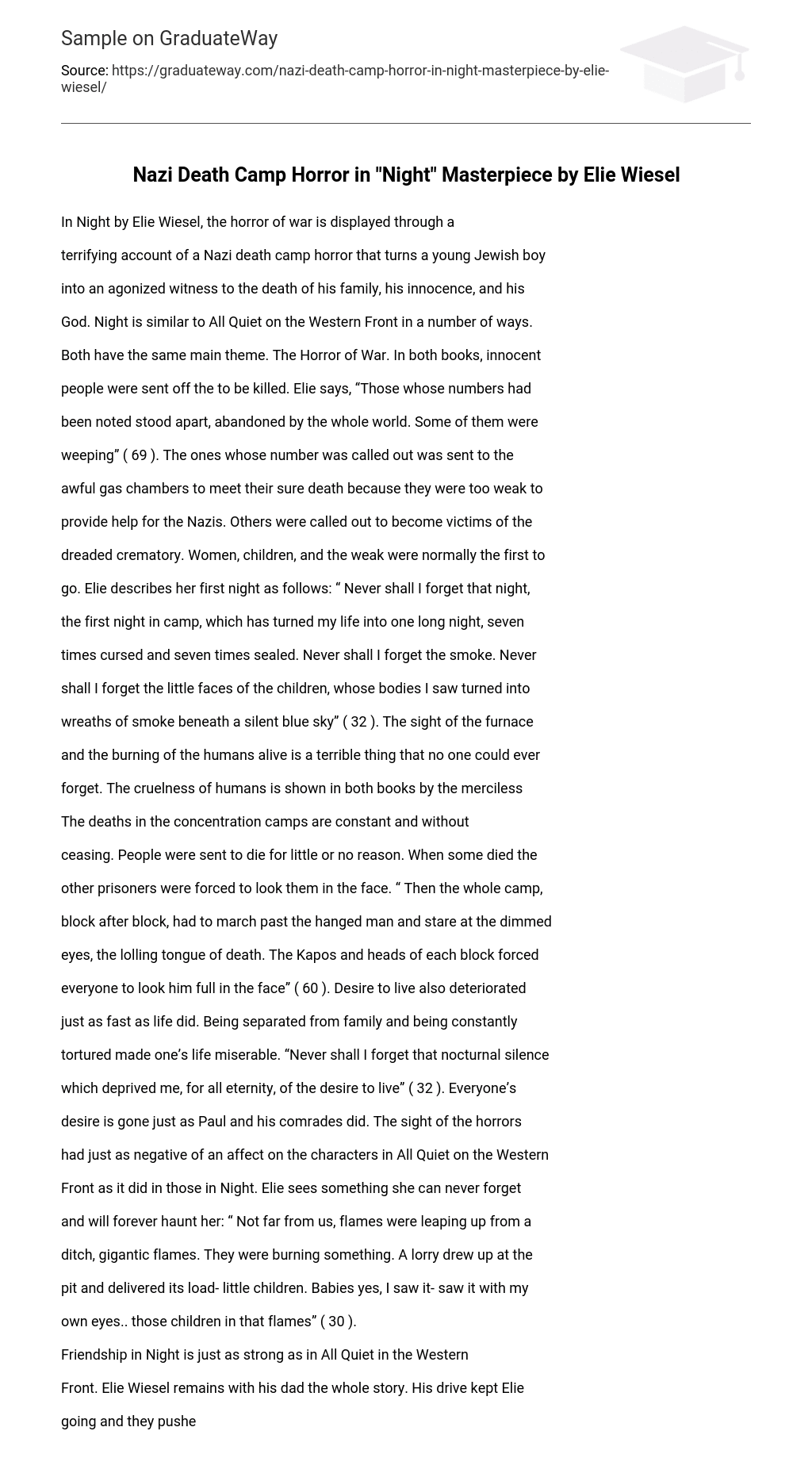In Night by Elie Wiesel, the horror of war is displayed through a terrifying account of a Nazi death camp horror that turns a young Jewish boy into an agonized witness to the death of his family, his innocence, and his God. Night is similar to All Quiet on the Western Front in a number of ways. Both have the same main theme. The Horror of War. In both books, innocent people were sent off the to be killed. Elie says, “Those whose numbers had been noted stood apart, abandoned by the whole world. Some of them were weeping” ( 69 ).
The ones whose number was called out was sent to the awful gas chambers to meet their sure death because they were too weak to provide help for the Nazis. Others were called out to become victims of the dreaded crematory. Women, children, and the weak were normally the first to go. Elie describes her first night as follows: “ Never shall I forget that night, the first night in camp, which has turned my life into one long night, seven times cursed and seven times sealed. Never shall I forget the smoke. Never shall I forget the little faces of the children, whose bodies I saw turned into wreaths of smoke beneath a silent blue sky” ( 32 ).
The sight of the furnace and the burning of the humans alive is a terrible thing that no one could ever forget. The cruelness of humans is shown in both books by the merciless The deaths in the concentration camps are constant and without ceasing. People were sent to die for little or no reason. When some died the other prisoners were forced to look them in the face. “ Then the whole camp, block after block, had to march past the hanged man and stare at the dimmed eyes, the lolling tongue of death. The Kapos and heads of each block forced everyone to look him full in the face” ( 60 ).
Desire to live also deteriorated just as fast as life did. Being separated from family and being constantly tortured made one’s life miserable. “Never shall I forget that nocturnal silence which deprived me, for all eternity, of the desire to live” ( 32 ). Everyone’s desire is gone just as Paul and his comrades did. The sight of the horrors had just as negative of an affect on the characters in All Quiet on the Western Front as it did in those in Night. Elie sees something she can never forget and will forever haunt her: “ Not far from us, flames were leaping up from a ditch, gigantic flames. They were burning something. A lorry drew up at the pit and delivered its load- little children. Babies yes, I saw it- saw it with my own eyes.. those children in that flames” ( 30 ).
Friendship in Night is just as strong as in All Quiet in the Western Front. Elie Wiesel remains with his dad the whole story. His drive kept Elie going and they pushed each other. “ Dazed by the sunshine and by my reverie, I felt someone tugging at my sleeve. It was my father. ‘Come on, my boy.” ( 37 ).
Elie is looking for a friend to rely on. She says, “ Where is God now? Where is he?” ( 61 ). She needs someone to rely on and let all her struggles out on. Her God she thought has abandoned her. She needs someone as much as Paul did when he relied on his troop members to keep each other going. Elie says, “ My father’s presence was the only thing that stopped me… He was running at my side, out of breath, at the end of his strength, at his wit’s end. I had no right to let myself die. What would he do without me? I was his only support” ( 82 ).
Their relationship is as strong as Paul and Albert’s when Paul held Albert up so he would lie out in the field to die. Friendship is a strong feeling and it may help one get through strong Night and All Quiet on the Western Front are very similar in terms of themes.
The horror of war and friendship were the ones that stood out. The horror of World War I and World War II are both alike. The Holocaust changed the way people acted, just as World War I. Friendship was the only thing people had to look to. Friendship kept drives alive in each person.





